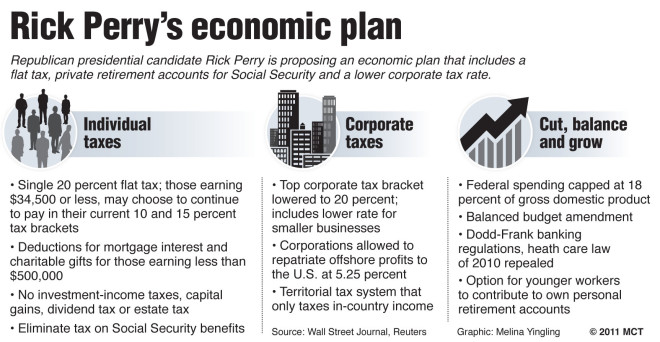Perry’s Job Record
The first Republican primary debate this year started with a catfight between Texas Governor Rick Perry and former Massachusetts Governor Mitt Romney over their respective job creation records. The exchange not only raised the entertainment value of the debate, but also one important question: is Perry’s record as strong as it seems?
Perry seems to have worked a minor miracle in Texas. His campaign website boasts, “[s]ince June 2009, more than 40 percent of all net new jobs in America have been created in Texas.” How has Texas fared so well in comparison to the overall US economy? Does this mean—as Perry implies—that his economic policies make him the United States’ best hope as president?
Texas’s job growth has outstripped that of most other states. Since 2008, Texas has seen 0.7% growth in number of jobs while the country as a whole has lost 5.6%. However, the US unemployment rate of 9.1% hardly dwarfs that of Texas—8.4%—in quite the magnitude Perry suggests. While much lower than that of states hit worst by the recession, like California, Michigan, and Nevada, it is still greater than many. Even New York and Pennsylvania have fared better than Texas.
Nonetheless, Texas has seen positive job growth in a time where most of the county has declined. Are Perry’s policies driving this economic resilience?
Perry created the Texas Enterprise Fund to give companies financial incentives to relocate to Texas. This, combined with Texas’s low wages, regulation, and taxation, made the move an appealing one. Texas gained many jobs by effectively luring them away from other states.
Despite Perry’s praise of free enterprise, government employees constitute a sixth of Texas’s workforce. Between 2007 and 2010, Texas saw a net loss of jobs in the private sector, while public sector employment rose by 6.4%. Since Texas received more federal stimulus money than all but two states, it’s not far-fetched to attribute much of its job growth to this rather than Perry’s actions.
Texas has also fared better than most of the United States because it entered the recession relatively late. Its energy-based economy was buoyed by 2008’s high oil prices. Ironically for Texas, strict regulation on mortgage lending dampened the fallout it experienced from the real estate crash. A decade-old law requires a 20% down payment to buy a home, which saved Texas from the kind of real estate disaster that most other states are facing.
Moreover, Texas’s population has grown twice as fast as the rest of the United States since 1990 as a result of immigration, migration from other states, and a high birth rate. However, employment acting as a function of population growth has given Texas the highest rate of minimum wage employment in the country: 9.5% of Texans paid by the hour make the minimum wage or less. The same deregulation that led to Texas’s job growth has hurt the quality of the job market overall.
Applying Rick Perry’s Texas policies nationwide won’t create jobs across the country. Texas turned to low wages, low benefits, and loose regulation to draw jobs from other states, but a President Perry wouldn’t have any other states to draw jobs from. Though wide deregulation and low pay might pull some jobs from highly regulated countries, it would be at the cost of fair wages, benefits, and the sort of regulatory safety net that kept the worst of the recession from Texas in the first place.
